[Original by Ko IMANAKA, Sudan Project (June 9, 2021); Translated by C. Rosenberg]
JVC runs five supplementary schools in Kaduqli. At the end of March, an ethnic conflict broke out in Shair district, which is near one of the schools.
A group of herders were traveling with their livestock when a dispute with the locals over water for their livestock broke out, which descended into a gunfight. The Sudanese Armed Forces were dispatched to the scene, but the locals blocked the roads and set checkpoints for the passing vehicles in resistance. Soon after, the following events occurred:
- A man uninvolved with the conflict who came to Kaduqli for a wedding ceremony was fatally shot.
- NGO vehicles were shot at.
- When an NGO employee passed through in a personal vehicle, he was asked his ethnicity. His windshield was then shattered.
Since the victim of the shooting mentioned above was an Arab herder of the Baggara people, the local Nuba people feared retaliation after last year’s large scale armed conflicts. Thus, many people fled from the Shair district to military bases or to the houses of nearby relatives. Most of the residents, including women and children, evacuated, and only a few men remained in order to protect their homes. Consequently, not only regular school but also the supplementary classes that we conduct were temporarily suspended.
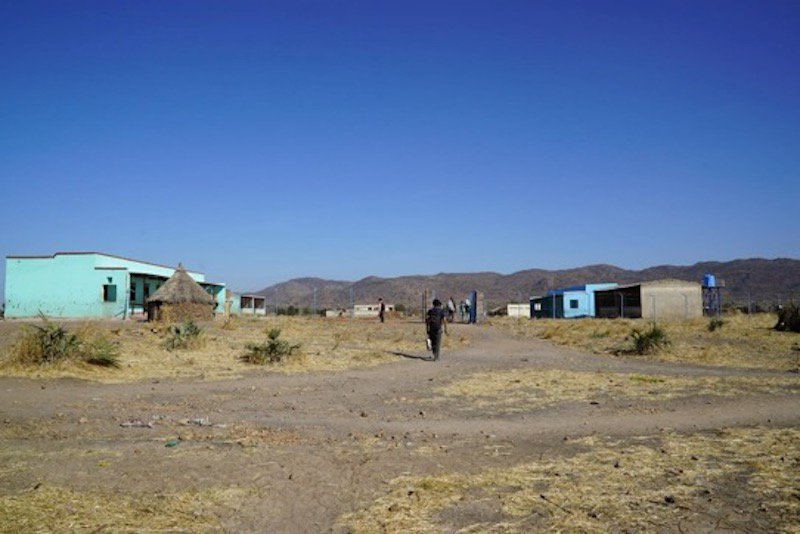
Panoramic view of Shair Elementary School. Photo: Jun Hori (Garden Journalism)
Last year, 62 students completed our supplementary school program in the Shair district, and in March of this year, we confirmed that 57 of them were going on to study at formal morning classes. A month after the conflict, people began to return to the district and the schools reopened. At the end of April, when we conducted followup at the formal morning classes, there were only 26 students still attending.
Musim, 14, had one of the top four highest scores of last year’s final exam and transferred into the fourth grade at the formal school.
He was very happy to hear that schools had reopened. “A week ago, I came back to the Shair district. I haven’t been able to go to school and just stayed inside for a month. I’m so happy that school is starting again! Miamia (great)!”
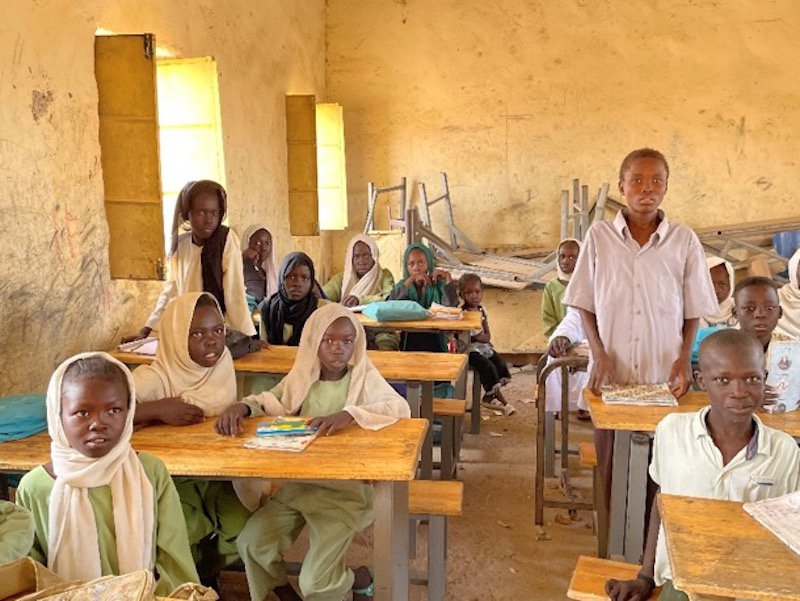
Musim is standing in the center. The girl standing on the left also completed one of our supplementary classes last year.
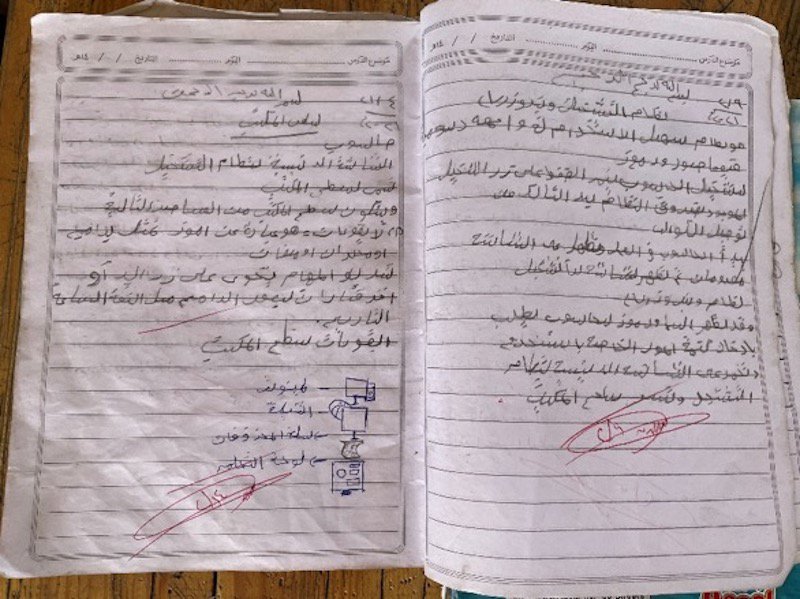
Musim’s notebook. He says his favorite subject is Arabic.
Mr. Dhahiya, a teacher at Shair Elementary School, expressed his concerns about the lack of students returning to school.
“Take a close look at these classrooms. There are still so many absentees. Other schools are beginning their end-of-year exams next week. Since our school was closed, we are not prepared to start having exams yet.
I am of Nuba ethnicity, but a lot of Baggara herders live around my home. We’ve built a good relationship without any issues. During the armed conflicts last year, I saw mutilated bodies, some missing heads and some mutilated by dogs. I guess since they were shot while fleeing to the mountains, they were discovered too late. But why do innocent people have to be killed like this?
Most of my siblings are soldiers; I am the only teacher. Since my family is poor, I have not been able to go to university, but I’m hoping that someday I can study in the capital Khartoum. I want to change Sudan’s education system. Tuition should be free, and the number of students per class should be reduced. Right now, our classrooms are overflowing: in one class, there are up to 130 students. We need to reduce that number to 40 students or less, but we just don’t have enough classrooms.”
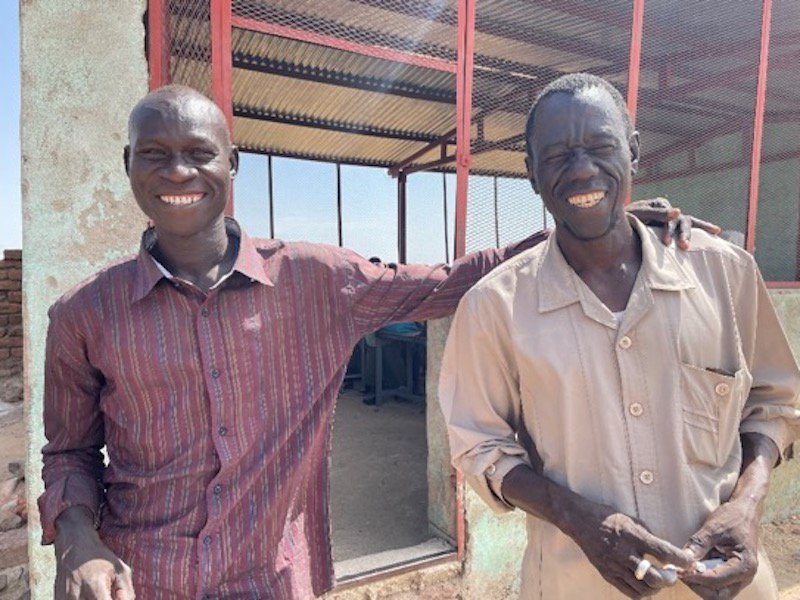
Teachers at Shair Elementary School. Left: Mr. Dhahiya, right: Mr. Badrddin
Mr. Abdulbaqi, a teacher and leader of the Shair district, also spoke about the role of education in this district.
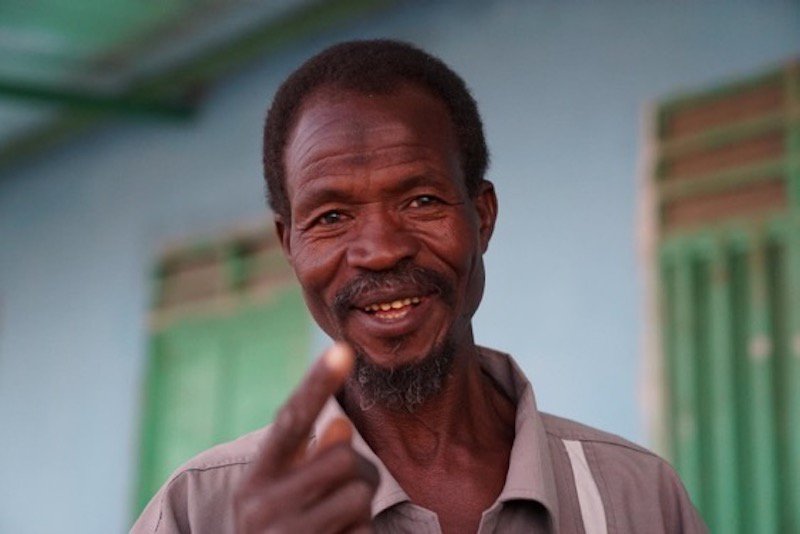
Mr. Abdulbaqi. Photo: Jun Hori (Garden Journalism)
“For children, education is like light. It guides them to future jobs and a future supporting themselves, their families, and communities. On the other hand, ignorance is the enemy of our families and communities. The conflicts that occur frequently here are caused by a lack of education. That is why we need to continually invest in education. Of course, education is not all about school; parents also play a very important role. This is what I tell the locals here. There are 18 different ethnic groups living together in Shair district. As a community leader and a teacher, my job is to prevent these groups from engaging in conflict.”
The Shair district is not the only place affected by the armed conflicts. Even in a district 15 kilometers away from Shair, the attendance rate of students has slowed down since the day of the conflict, as parents feel uncomfortable sending their children to schools near the edge of their villages.
Armed conflicts like this can easily rob children of educational opportunities. However, there are many people like Mr. Abdulbaqi, who emphasize that the need for education exists and even grows in said conflict-ridden areas. Along with providing support to children who have lost access to education, we are also implementing initiatives to help them avoid conflict and coexist as a community. We will keep you posted on the details of our initiatives.
Share This: